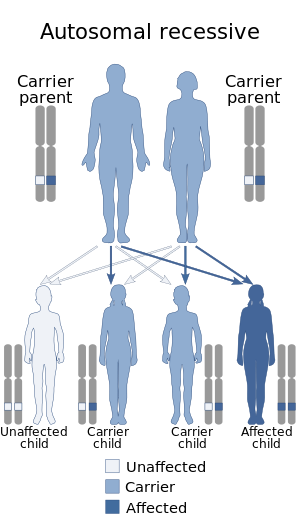LPS-responsive beige-like anchor protein deficiency
| LPS-responsive beige-like anchor protein deficiency | |
|---|---|
 | |
| This condition is inherited in an autosomal recessive manner. | |
LPS-responsive beige-like anchor protein deficiency is a rare genetic condition caused by the absence of LPS-responsive beige-like anchor protein (LRBA).
Signs and symptoms
The presentation of this condition is variable making the diagnosis difficult. The most common features include[1]
- Immune dysregulation (95%)
- Organomegaly (86%)
- Recurrent infections (71%)
- Hypogammaglobulinemia (57%)
- Granulomatous lymphocytic interstitial lung disease (38%)
There is also a tendency to develop inflammatory bowel disease.
Genetics
The LBRA gene is located on the long arm of chromosome 4 (4q31.3).[citation needed]
Pathogenesis

LBRA protein interacts with the protein CTLA4. The absence of LBRA increases the turnover of CTLA4 and interferes with vesicle trafficking.[citation needed]
Diagnosis
In terms of the diagnosis of this deficiency we find that pathogenic genetic variants in the LRBA gene confirm LPS-responsive beige-like anchor protein deficiency[2]
Differential diagnosis
Management
Along with treatment for infections and other complications several additional treatments have been tried. These include hematopoietic stem cell transplantation, immunoglobulin replacement and immunosuppressive treatment.[1]
History
This condition was first described in 2012.[3]
References
- ↑ 1.0 1.1 Gámez-Díaz L, August D, Stepensky P, Revel-Vilk S, Seidel MG, Noriko M, Morio T, Worth AJJ, Blessing J, Van de Veerdonk F, Feuchtinger T, Kanariou M, Schmitt-Graeff A, Jung S, Seneviratne S, Burns S, Belohradsky BH, Rezaei N, Bakhtiar S, Speckmann C, Jordan M, Grimbacher B (2016) The extended phenotype of LPS-responsive beige-like anchor protein (LRBA) deficiency. J Allergy Clin Immunol 137(1):223-230
- ↑ Mangodt, T. C.; Vanden Driessche, K.; Norga, K. K.; Moes, N.; De Bruyne, M.; Haerynck, F.; Bordon, V.; Jansen, A. C.; Jonckheere, A. I. (13 July 2023). "Central nervous system manifestations of LRBA deficiency: case report of two siblings and literature review". BMC Pediatrics. 23 (1): 353. doi:10.1186/s12887-023-04182-z. ISSN 1471-2431. Archived from the original on 20 October 2023. Retrieved 6 October 2023.
- ↑ Lopez-Herrera G, Tampella G, Pan-Hammarstrom Q, Herholz P, Trujillo-Vargas CM, Phadwal K, Simon AK, Moutschen M, Etzioni A, Mory A, Srugo I, Melamed, D and 21 others. Deleterious mutations in LRBA are associated with a syndrome of immune deficiency and autoimmunity. Am J Hum Genet 90: 986-1001
External links
| Classification |
|---|